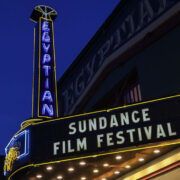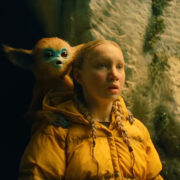The 10 Best Film Scores Of 2022
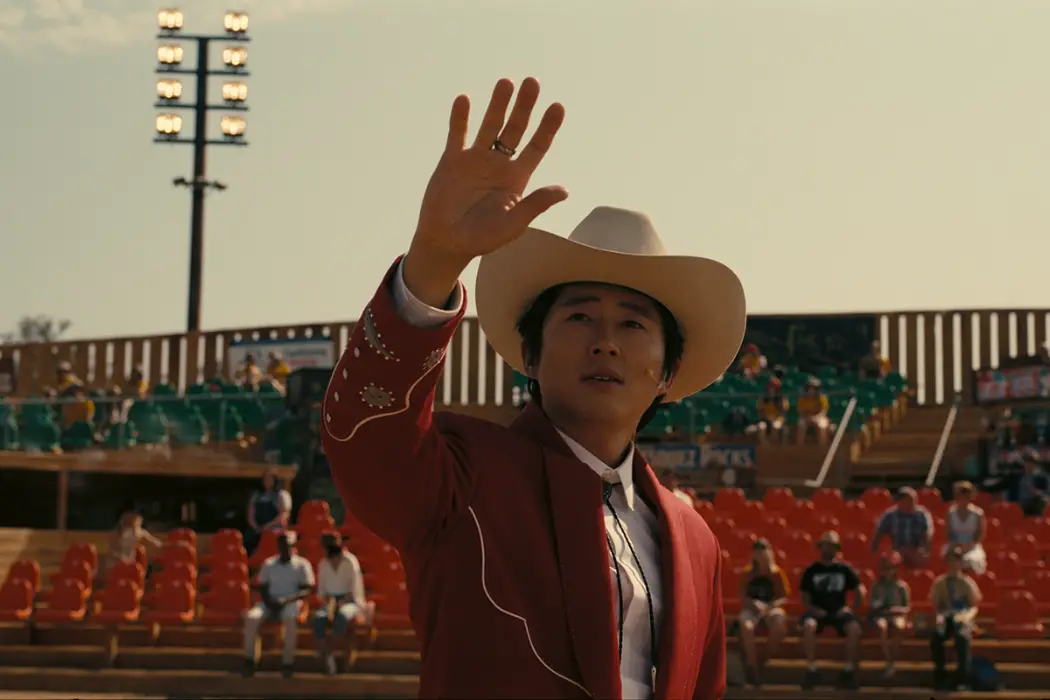
Film critic, Ithaca College and University of St Andrews graduate,…
In a packed year for the movies, the film scores of 2022 are equally plentiful. In a year filled to the brim with Marvel projects, indie hits, and myriad worthwhile streaming projects competing to stay ahead of obscurity, you probably wouldn’t believe me if I told you that one of the best action scores of the year wasn’t in multiplexes, but it was in a Ryan Reynolds Netflix movie that nobody saw called The Adam Project. Rob Simonsen’s score for that time-traveling Steven Spielberg riff isn’t in the top 10 of the year, but it’s a good case study for 2022’s scores in general.
The score embraces a full orchestra, which was probably a relief for Simonsen and the players in the wake of several years of remote recording sessions due to the pandemic. The score is unapologetically sappy, emotional, and proud, grounded with sensitive piano running through the main theme, and the action cues for the more exciting tracks bring out those huge brass notes, pounding drums, and light woodwind breaths we’ve come to expect from big-budget action films. Simonsen’s efforts here show that streaming films in 2022 sound indistinguishable from normal fare you’d see in the theater. Unfortunately for Simonsen, his best work has some terrible titles, with the best action tracks in The Adam Project titled things like “Ouchie with the Face” and “Punch That Sh*t.”
I’ve listened to all of the major scores from 2022 — that’s 110 in total, many of which are well over an hour in length. (I’m looking at you, Avatar: The Way of Water.) Some are indistinct, like Lightyear; some are annoying, like Justin Hurwitz’s try-hard, throw-everything-at-the-wall score for Babylon; and others are very evocative of better scores, like Howard Shore’s score for The Pale Blue Eye, which sounds exactly like his music for Lord of the Rings. But among them are 10 standout scores that not only define the best films of 2022 but also deserve a place in the great pantheon of film scoring.
10. Tyler Bates and Chelsea Wolfe, X
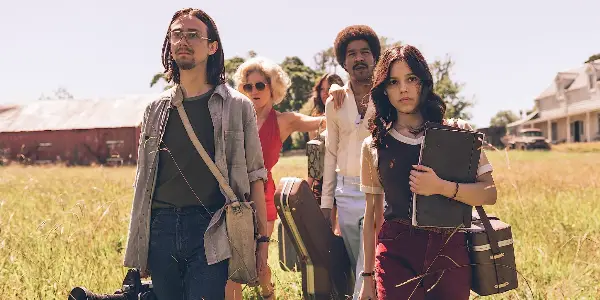
The music is more than crucial to X — for some critics, it is the source of the horror. Some critics (myself included) argue that Ti West’s Texas Chain Saw Massacre throwback feature is little more than a gerontophobic grindhouse film with some nudity and sex thrown in for good measure. Besides the disquieting atmosphere, most of the scares come from a) old people standing around, b) old people acting strangely, and c) naked old people. If that isn’t your bag, Tyler Bates and goth rocker Chelsea Wolfe are here to pick up the slack, delivering an eerie noctambulist theme for “Theda” and “Maxine Meets Pearl” that uses Wolfe’s breathy singing and threatening electronic tones to deliver sickly, ethereal menace. “My God,” with its hoarse, fragile, guttural breathing, dissonant humming, and dread-inducing bass, is sort of like if you made a song out of the death sounds in Phasmophobia. But above all, the score for X is not stuck in the ’70s — it’s distinctly modern. As far as ’70s slashers go, it’s far more Suspiria Remake than Original Recipe Suspiria.
X has a great creepy score, but so do many films from 2022 — what separates X from its sister horror scores like Fresh, Significant Other, Sick, and Hellraiser is how versatile Bates and Wolfe can get. Tracks like “Fucking Finally” allow Bates and Wolfe to play up the tongue-in-cheek ’70s camp of West’s grainy splatterfest with cheesy guitar riffs, and they follow up on the film’s sexploitation inspo in the “waka waka” instrumentation of tracks like “Dolls” and “Use Your Telephone,” perfectly blending the fun throwback sleaze with the film’s characteristic mounting dread — the track “Nice Girl” gets extra points for ending with an orgasm.
The atmosphere X creates and flourishes in ultimately has very little to do with West’s visual choices and everything to do with its soundscape. Sexed-up teens on a farm, a mysterious and creepy old couple, a film crew shooting where they shouldn’t — we’ve seen all of this before. But Wolfe’s unsettling vocals and Bates’ unpredictable synth work make for an auditory experience unlike anything I’d heard in 2022. They create more than just a soundtrack for a slasher — it’s like listening to ghosts crawl into your ears through your headphones.
9. Michael Giacchino, Jurassic World Dominion
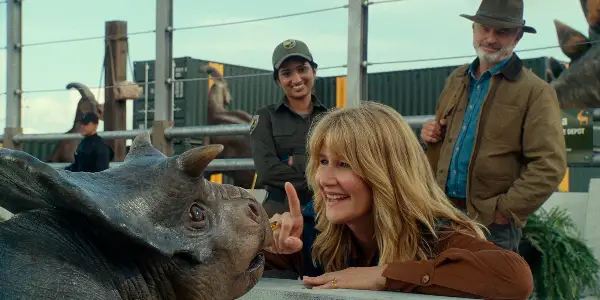
Where there are blockbusters, there’s Michael Giacchino. The star composer scored a staggering five films in 2022, each one a bigger-budgeted project than the last: Marvel’s Werewolf by Night (which he also directed), Pixar’s Lightyear, the Robert Pattinson-starring The Batman, Thor: Love and Thunder, and Jurassic World Dominion. Giacchino had been with the Jurassic World franchise since Chris Pratt first ran away from an Indominus in 2015, and he matches John Williams’ majestic sweep, genre versatility, rollicking action, and heartfelt awe with his Dominion score. He hardly leans on the original Williams score at all, only revamping it a few times throughout the hour-and-47-minute soundtrack. (Also, sorry, but not only is Giacchino excellent, but he fires on all cylinders for an hour and 47 minutes.) Giacchino juggles more characters in Dominion than a Velociraptor has fingers, giving each their own motifs and themes and mixing each into a fresh genre — Western, heist, action-adventure, horror — as the mega-budget franchise-ender stomps through its Gigantosaurus-sized runtime.
Giacchino always has an infectious level of fun with his scores, and the silly Jurassic World threequel is the perfect outlet for that. He brings his characteristic love of puns to his track names too, rolling out tracks like “All The Jurassic World’s A Rage.” But beneath the layer of goofy charm, listen to the compositions. “Free-Range Kidnapping” begins with a very Spielberg-esque mysterious tone — a simple flute, leading into an ominous orchestra, and brass slowly replaces the flute as the tension mounts. And then there are the hints of a heist film, with some tense percussion building and building, then in come the strings, and finally, before you know it, the veil lifts and it’s full-on chase mode. The classic Jurassic percussion is back, and the strings take on a Jaws-like melody, falling like T-Rex footsteps.
“In Contempt Of Delacourt/Dance of the Atrociraptors,” which comes as the gang goes to Valletta, is a feverish mosh pit of frenetic action themes, electric guitars, and waves of woodwind, and on top of it all, musical references to the first two Jurassic Park films. “Da Plane And Da Cycle,” the capstone of the Malta sequence, is two and a half minutes of breathless escalation. Giacchino somehow keeps setting the stakes higher and higher, and the final rush of the Jurassic World theme at the end of the track is enough to knock you off your feet. Few people in the business, I’ll wager, love their jobs as much as Giacchino.
8. MONO, My Story, the Buraku Story
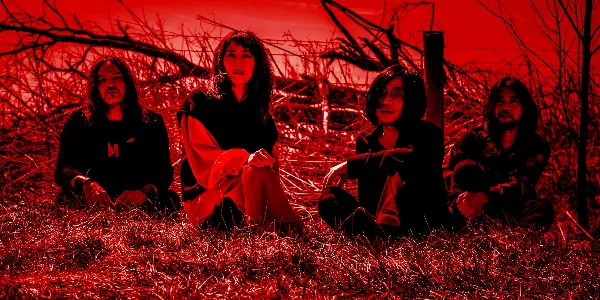
Classism exists everywhere, but in Japan, the lowest caste is called the “burakumin.” Japan’s shunned “untouchable” class comprises tanners, undertakers, and butchers — any ostensibly dirty job that involves death. This prejudice in Japanese society extends back to the Edo period, but the ghettoization of the group connected to this bloodline continues to pervade modern Japan. In 2022, a three-and-a-half-hour documentary, My Story, the Buraku Story, directed by Yûsaku Mitsuwaka, got a huge marketing push because of its composers: the Japanese experimental band MONO. While nobody seems to have seen the actual movie yet, MONO’s score release was a major event in the music world, and for good reason; MONO has danced on the edge of mainstream acclaim for over 20 years, releasing 11 albums and amassing a ton of underground credibility. This is the band’s first soundtrack for a feature.
The score itself is understated, dissonant, and aesthetically brackish. It fits the complex instrumental ambience that post-rock fans expect of the group, but now that this sound is hitched to a sociopolitical message, it invites deeper, more engaged listening. “Doumyaku,” the premier track, sounds like an underwater ritual of rebirth, all sunken choirs and echolocated noise. I love the infinitely descending strings of “Watashi,” like a Möbius strip waterfall. Pianist Tamaki Kunishi takes control on the third track, “Kokyo,” a melancholy and minimalist song that isolates the piano in a calm sea of ambient strings. Kunishi gets the spotlight again on “Yurameki,” but this time, the accompaniment is stripped away, leaving just the piano as the core of the sound. Kunishi’s keyboard work doesn’t get much play in the rest of the album, but in these two tracks, she establishes the unsteady, frightened yet optimistic beating heart of the soundtrack. Aptly for the subject matter, the songs channel a sense of isolation and pain that’s really only approachable through this specific fog of ambient-searching rock noise.
Fans of MONO will likely glom onto (and have, if Spotify listenership is to be believed) the final track, “The Place,” which sounds more in line with the group’s previous work. But the rest of MONO’s score holds more appeal for me — the somber footfalls of “Kioku” and the fatalist ambient drones of “Kattou” do more to dramatize the sadness, anger, and solidarity that the burakumin require on their side.
7. Daniel Pemberton, Brian and Charles
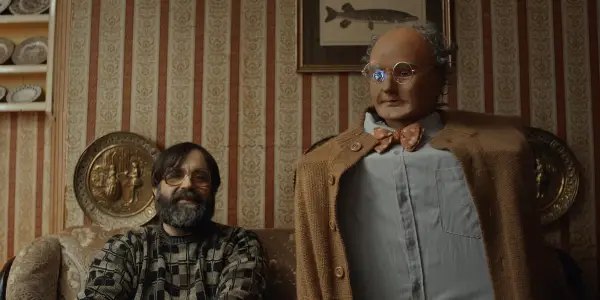
Daniel Pemberton, composer for Spider-Man: Into the Spider-Verse and its sequels as well as Steve Jobs, Enola Holmes, and The Bad Guys, has been a towering figure in film score composition for the last six years, and Brian and Charles feels like it best encapsulates him as an individual and as a composer. For a star on the rise, Brian and Charles, a low-budget Welsh sci-fi comedy about a loner (David Earl) who builds himself a robot (Chris Hayward) out of scraps, seems like an odd project for Pemberton. It’s nestled between work on a season of the Apple TV+ spy series Slow Horses and two Hollywood period pieces with huge ensembles, Amsterdam and See How They Run. But the makeshift wonder and distilled harmony of the score convince you that it’s not just a passion project — it’s an emotional tour through the scraggy Welsh countryside, a low-key chance for the composer to get weird and wonderful.
The score is whimsical and profound, displaying commensurate knowledge in composition as well as in emotional insight. Individual tracks sound like underwater symphonies, their alien sounds catching you off-guard with how simple the melodies seem. Synth cues come together like birdsongs in the first track, “Wales, Land of Wonder,” beautiful and randomly aflutter. Fitting for a film that takes place in the desolate and achingly gorgeous Welsh countryside, the score reflects quintessentially Celtic music traditions, the whistling synths sounding like a tin or low whistle, both hallmarks of Celtic music. Brian and Charles’ score more aptly channels Irish and Scottish music than the fiddle- and harp-led folk music that Wales is generally known for, but on tracks like “Hello Charles,” the whistling winds help you imagine the mountainous, verdant landscape.
More than just random jumbles of sound, the score for Brian and Charles is secretly methodical and precise. “Wales, Land of Wonder” constructs a rigid core for the theme with a winding trill surrounding it, like how a spiral staircase is constructed around a supporting newel, embodying the off-kilter relationship between robot and creator that Charles and Brian enjoy. A later track, “The Workshop Of Invention,” echoes something our critic, Linsey Satterthwaite, wrote in her review: The film is such a UK invention, yet it also radiates whimsy despite its focus on a man living in such seclusion. He’s definitely spent some winters alone, sealed off from the rest of the world in his tiny Welsh cottage, tinkering away at one invention after another. The beauty, tragedy, and adventurousness of such a character are splashed throughout Pemberton’s score — particularly “The Workshop Of Invention,” which feels so sad and plaintive, yet full of life. Like Brian’s inventions, the song is a promise: This might not matter, but one day, it’ll all be gone, and all we’ll have to show for ourselves is the joy we’ve left behind.
6. Dan Wool, Mad God
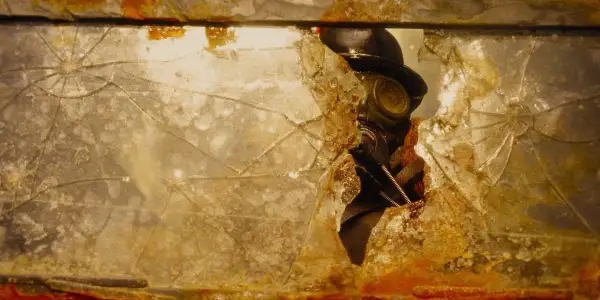
Phil Tippett’s stop-motion masterpiece, Mad God, is a dark, slimy, squelchy, disturbing film, full of pus, excrement, blood, and mud as far as the eye can see. And somehow this black star also has one of the most beautiful scores of the year. Composer Dan Wool not only uses his tempestuous, tortured soundscape to translate the screams of Mad God into a frightening, melodic banshee wail, but he also digs deep into Tippett’s twilight nightmare, dredging up magic, illumination, and hope. Somehow, in a film set in a post-apocalyptic, war-torn wasteland full of disgusting creatures being squashed, shot, and electrified into goop, the score finds a ray of sunshine through it all.
The score has dozens of atmospheric sounds, off-kilter instruments that sound bent out of shape, and recurring motifs. The world of Mad God is hostile and treacherous — its plot follows ill-fated explorers traveling through the world trying not to die, sort of like Groundhog Day if Bill Murray kept waking up in a gulag. Wool incorporates as much of that madness as he can into his score, but he also introduces a Western stride to our first track, “Long Way Down,” which not only establishes Mad God’s otherworldliness but also the genre playfulness Tippett delights in. “Long Way Down” decomposes into ambient sound — like so much of Mad God’s score, it uses glockenspiel, atmospheric electronic hums, faint moans, and squeaks to evoke a biological techno-world that short-circuited nine centuries ago.
Wool loves integrating “found” components into his score, like a police siren or a staticky radio feed — elements of the sound mix that you might find diegetically throughout Mad God. But his most resplendent contributions to the score, again, are those hopeful segments. He finds a tragic, soulful acoustic guitar line that crackles with a discordant merry-go-round piano. That soft, gentle theme suggests our nameless explorers remembering a world above the grime, like a dream a fern might have of the forest canopy. The theme never sounds the same twice. And in such a purposefully joyless, aggressively depressing film as Mad God, Wool’s score consistently harbors the only potential for hope or peace. But this incandescent music, like the film, remains, on the whole, ominous, guarded, and cold. Like the dystopia of Mad God itself, it’s like a carousel built from Foucault’s panopticon.
5. Sarah Schachner, Prey
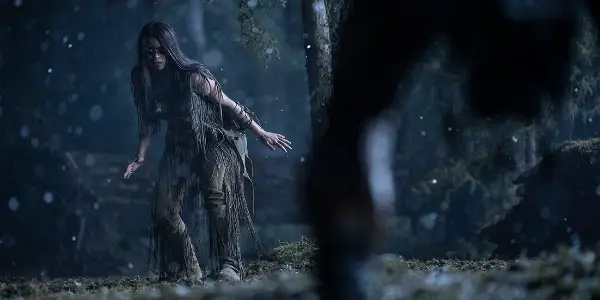
Sarah Schachner’s score for Prey is every bit as beautiful, thrilling, and refreshing as Dan Trachtenberg‘s film was when it premiered on Hulu in summer 2022. The prequel Predator movie takes the action back to the 1710s, when Native American tribes on the Great Plains were under threat from interloping European settlers and fur trappers. Oh, and also alien monsters hunting them for sport. Schachner, a video game composer on titles like Assassin’s Creed Valhalla, brings a diverse array of instruments to the Predator franchise, from Mongolian horsehead cellos and Kazakh violins to a double-barreled flute played by Pueblo musician Robert Mirabal. Mirabal also sings, in tracks like “Communion.” Schachner plays all the stringed instruments herself.
Through the creation of unique motifs and tones for the film’s two major characters — the young, assertive Naru (Amber Midthunder) and the fearsome alien hunter (Dane DiLiegro) — Schachner composes a film score that perfectly embodies the themes not just of the history it’s evoking, but of its story it’s telling. Through the precise, sharp strings and aggressive percussion of tracks like “The Onslaught,” we see the Predator’s perspective of eager and relentless carnage. “The Predator’s theme is really from his point of view rather than the viewer reacting to him,” she said in an interview with Fangoria. “It’s intense and methodical, with a bit of focused rage. It’s what I’d imagine he’d be feeling while tracking and effortlessly slashing through 20 French trappers.”
Naru’s theme, by contrast, is soulful and searching and feels like it develops throughout the film. “Beyond the Great Plains,” one of the most beautiful tracks in the score, centers its strings around this sense that Naru is looking for her place in the world. And from there to “Naru’s Way,” she’s earned something of a heroic theme. The rising strings complement her journey, suggesting a spiritual power beneath Naru that ultimately helps her triumph over the Predator. Even Schachner’s more straightforward action tracks remember and reintegrate these ideas and themes, creating a sonic identity for the film on tracks like “Horseback Ambush” and “Brave Girl” that’s at once authentic and fierce, the strings swelling high and crashing low like feet running through water.
4. Colin Stetson, The Menu

The first thing you hear in Colin Stetson’s score for The Menu is strings — sudden, dramatic, but immediately combining into an elegant orchestra. Then, there are woodwinds, a circular rhythm that undergirds the foppish lives of the film’s characters and the circadian nature of restaurant life at Hawthorne. In this early scene of Mark Mylod’s culinary satire-thriller, the rich and posh are boarding a boat to journey to a remote island for what will soon become the final foodie trip of their lives. The music complements the film’s duplicity — like Mylod, Stetson hardly wants to give away the terror into which these people are stepping foot. So “All Aboard,” the film’s first music cue, is plucky but ostentatious, uneasy yet serene. The score for The Menu feels tightly controlled — Stetson and collaborators Matt Combs and Greg Fox did the entire soundtrack by themselves. That precision — including the soul-searching saxophones of “Nature is Timeless” and the exact violin frisson of “Welcome to Hawthorne” — mirrors the steely gravitas and gastronomic tyranny of Ralph Fiennes’ villain, Chef Julian Slowik.
“The Mess” is the first track that reminds you that, hey, Stetson is the same composer who scored Hereditary and Color Out of Space. The pretense of fun, excited orchestral ballads drops and the croaking horror comes to the fore. The same elements and instruments that brought grace and vitality in “Nature is Timeless” bring dread and eerie anticipation in “The Mess.” Appropriately, the song marks the first time the film lets its mask drop and shows you what it really is — and things only get darker from there.
The perverse, morbid string pluck returns for “Our Side or Theirs,” and Stetson goes full death opera for “Fallen Angel.” The brilliance of The Menu’s score is how he’s able to seize that beauty back in tracks like “Take the Evening Air” and “The First Cheeseburger You Ever Ate.” Stetson seamlessly incorporates instruments unusual for film scoring like Tibetan bowls, glasses, pots, pans, and a Swedish string instrument called a nyckelharpa, all without drawing attention to them. But tracks like “The First Cheeseburger You Ever Ate” bring poignancy, resolution, and a bit of tragedy to the ending of The Menu, and Stetson’s final great victory on the score is how shrewdly he’s able to tap into Chef Slowik’s purifying experience cooking a burger and all the emotions of that climax. He reminds you that Slowik and his cronies aren’t monsters — they’re artists and craftspeople, and the score reinforces a reverence for the culinary art form that Mylod similarly maintains throughout even the film’s bloodiest scenes. Wonder, tension, hope, rediscovery, and grease — it’s all there in Stetson‘s score, set to solemn woodwinds, sandwiched in a sesame seed bun.
3. Tyler Bates and Timothy Williams, Pearl
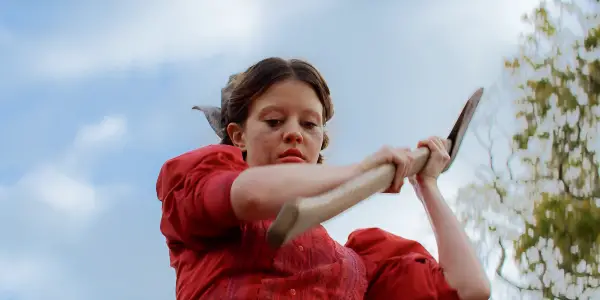
Odd that Pearl, Ti West’s horror prequel about a delusional, ax-murdering farm girl, has the most beautiful score of the year. Tyler Bates, returning from X, teams up with Timothy Williams for the project, intended to stand apart from but complement West’s earlier, ’70s-set slasher. Pearl takes place in the 1910s, but its influences are all over the place. There are callbacks to The Wizard of Oz (1939), The Red Shoes (1948), Douglas Sirk (the 1950s), and Mary Poppins (1964). Free from any sort of temporal consistency, Bates and Williams instead turn their score into a potpourri of references and motifs, drawing equally on big, old-Hollywood brass scores and 1920s cosmopolitan orchestras.
Tracks like “The Red Dress” and “What About Your Dog?” sound like familiar horror scores with the addition of some tremendous trembling violins, John Williams-esque cellos, big mean brass, and a crocodilian tuba. Gator nerds know that a B-flat on a tuba is the same frequency as a male American alligator — an appropriate motif for Pearl (Mia Goth), who keeps one of the hungry beasts named Theda in a pond on her property. While half the score tells us we need to be scared and plays up the horror elements, the other half resides in the mind of our bitter, farm-bound heroine. The main titles articulate Pearl’s hopes and dreams of one day being a film star. Timothy Williams’ background as a concert pianist shines through in these tracks and defines Pearl. The compositions are big, dreamy, vast, and romantic. There are hints of Bernard Herrmann’s iconic, doomed score for Vertigo in those main titles, the desperate, crying, outstretched hand of the violins in Herrmann’s compositions mirrored in the wide toothy grin and rolling timpani drums of Bates and Williams’ score.
Fittingly, since the protagonist of Pearl is a disillusioned young woman with dreams of becoming a chorus girl in a Hollywood production, and since the film’s own sense of time is all over the place, the score isn’t Golden Age Hollywood as much as it probably wants to be. And that’s fine! Pearl has a great score, but there isn’t much silence or stillness to be found in it. It lacks that quality of peace, the flair for melodrama, and the extended reliance on one singular instrument that many Golden Age scores have. There’s a noticeable lack of harp. It also isn’t as classy. Bates and Williams effectively and efficiently emulate Golden Age Hollywood while not completely melding with it, kinda like Pearl’s delusions of celebrity. While many critics of the score have compared it to Golden Age Hollywood, it ain’t Herrmann or The Wizard of Oz. Don’t get me wrong — the score is beautiful, larger than life, and stings of tragedy. But if I had to quibble with it, like much of Ti West’s filmmaking, the score is missing Golden Age Hollywood attributes that would have made it more resonant, such as specific motifs, melodrama, and the general ability to, you know, chill out. But after listening to tracks like “The Whole World Is Gonna Know My Name,” it occurs to you that you might not wanna say that to Pearl. She might just kill you with an ax.
2. Michael Abels, Nope
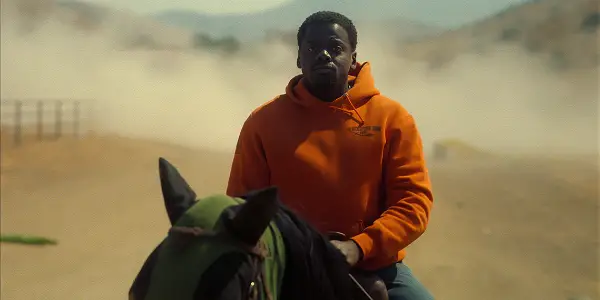
Last year, and featured on my Best Film Scores of 2021 list, Jeymes Samuel redefined what a western could look and sound like with The Harder They Fall. In 2022, Jordan Peele did the same. With his otherworldly alien monster movie Nope, the filmmaker put a Black hero (OJ Haywood, played by Daniel Kaluuya) in the saddle and gave him a killer score from Michael Abels. The triumphant horns and strings of “Jupiter’s Claim” announce the start of the film’s adventure, and Abels shows that he’s able to balance the kitsch of Steven Yeun’s huckster character and the John Ford Western with the gravitas and depth demanded from Peele’s screenplay. There’s banjo here and a kind of trotting sincerity, but there’s that trademark wistfulness and horse-hoofed call to adventure, the spirit that defines the Steven Spielberg films to which Nope is clearly paying tribute. Delicate flutes light up “Brother Sister Walk,” and the trembling soulfulness of “Growing Up Haywood” brings the score into more complex emotional territory.
Abels got on the film-scoring horse with Peele, first working on Get Out back in 2017. Nope has no shortage of great tracks, but the highlight of the album is the same song that made Peele take interest in Abels in the first place: “The Run (Urban Legends),” adapted from a 10-year-old original composition from Abels called “Urban Legends.” The song begins with frantic but controlled strings from two or three violinists before the horns kick in. Those horns blare out from the darkness like Jean Jacket shooting over the mountains and climbing into the clouds. Thudding percussion like OJ’s horse’s gallop underscores the brass. Abels creates this intense juxtaposition through motifs for his two major characters in this scene — the cowboy and the alien. And that’s only in the first 26 seconds — the track evolves as the cellos break out and begin a new melody as OJ starts his run. But it’s not all tense — triangles in the background remind you of the whimsical, interplanetary Spielbergian roots of Nope and inject some welcome wonder into the drama. Then, at 40 seconds, when the strings ramp up, it’s monkey time: Chimp-like whoops appear in the back (my guess is either some oddball percussion or string instruments funkily playing staccato), emulating the chimpanzee motif throughout Nope. At 47 seconds, the score breaks into a full gallop as the hero theme emerges. OJ’s haulin’ ass down the dirt road with Jean Jacket bearing down on him, and Abels never lets us forget for a moment that this is an adventure. On Nope, Abels mesmerically blends the bold classic Hollywood symphonies of Elmer Bernstein’s The Magnificent Seven score with modern horror film scores, with a trace of Talking Heads’ “I Zimbra” thrown in there for good measure. Abels takes full advantage of an orchestra rejuvenated and maybe a little mad after years cooped up due to COVID, and he sets them on Peele‘s gorgeous, old-West, outer-space thrill ride.
Honorable Mentions
Jeff Beal, Raymond & Ray
Terence Blanchard, The Woman King
Carter Burwell, The Banshees of Inisherin
Rob Simonsen, The Adam Project
Dan Deacon, Hustle
Nima Fakhrara, Sick
William Ryan Fritch, The Scale of Hope
Michael Giacchino, Werewolf by Night
Matthew Herbert, The Wonder
Abel Korzeniowski, Till and Emily
Jed Kurzel and Kevin Kiner, Samaritan
Lovett, Hellraiser
Mark Mancina, The Sea Beast
Mykyta Moiseiev, When the Trees Fall and Ivan’s Land (with Syoda)
Laetitia Pansanel-Garric, Quand Passent Les Oiseaux
Daniel Pemberton, The Bad Guys
Steven Price, My Policeman and The Swimmers
Howard Shore, Crimes of the Future
Alex Somers, Fresh
Pinar Toprak, Slumberland
John Williams, The Fabelmans
1. Dan Deacon, Strawberry Mansion

Dan Deacon has made me cry many times. First, it was with a live performance of “Feel the Lightning.” Then, it was with the Strawberry Mansion score, about eight or nine times. Psychedelic one-man-band Deacon has released many experimental synth albums, and he’s been an active agent in the music world since 2007. Alongside his vibrant and always highly technical electronic compositions, he’s well-known for his wild, innovative live solo performances. In the world of film scoring, he’s composed for Francis Ford Coppola’s Twixt and Alan Resnick’s Unedited Footage of a Bear, so he’s got indie cred pouring out of his eyeballs. Deacon became a major name in the scoring scene only in 2021, composing for the documentaries Ascension and All Light, Everywhere before making the jump to big-name fiction films with Netflix’s Adam Sandler basketball drama Hustle. Strawberry Mansion is his oddball score of the year, while his contributions to Hustle are characteristically complex and poignant. But listen to Hustle and you’ll come away thinking the orchestra is tremendous — listen to Strawberry Mansion and it’s the Dan Deacon show through and through.
Deacon’s score for the sci-fi dystopian dream love story Strawberry Mansion is as nebulous, technical, and thaumaturgical as the film and equally good at evading description. For one, the instrumentation is all over the shop, and while one can pick out the motifs and instruments Deacon and directors Albert Birney and Kentucky Audley chose and committed to, trying to sort out what’s an oboe, what’s a drum machine, and what’s a harp is a madman’s game, like cataloguing every dot in a Jackson Pollock painting. Fitting for a confectionary-hued fantasy story like Strawberry Mansion, Deacon paints with deep pink giddiness and a roiling maelstrom of colorful sound. His music can be pregnant with tension and then fizzle into unadulterated whimsy, as in “Ice Cream Lick,” or it can begin in nirvana and gently float down to Earth again, as in “Free at Last.” “Walking to the Credits” relaxes you with its idyllic harps, while “Captain Preble at Sea” begins with a fog horn-esque brass blast and then fades into a lovely synthesized violin as the full orchestra teases at returning. And if variety is what you’re after, then “To Losing One’s Mind” happens to sound just like an underwater “Donkey Kong Country” level.
But the melody of “Final Dream” is what stuck with me most from Strawberry Mansion’s immaculately furnished score. From that mandolin-strumming intro to the gentle strings that cradle you and spread their wings, the song is transcendent in its beauty and unpretentious in its grace. “Some music is merely conveying detail,” Deacon said in an interview with Film Festival Today, “but there’s also music that exists just for making the air more beautiful.”
Does content like this matter to you?
Become a Member and support film journalism. Unlock access to all of Film Inquiry`s great articles. Join a community of like-minded readers who are passionate about cinema - get access to our private members Network, give back to independent filmmakers, and more.
Film critic, Ithaca College and University of St Andrews graduate, head of the "Paddington 2" fan club.






